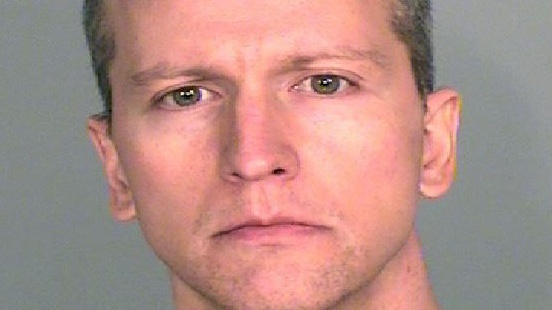After nearly a year since former officer Derek Chauvin killed George Floyd outside of a Minneapolis corner store, a jury has reached a verdict.
Jurors deliberated for more than 10 hours over two days before reaching a verdict and found the ex-officer guilty of third-degree murder, second-degree unintentional murder and second-degree manslaughter, according to CNN.
Prosecution and defense teams rested their case after three weeks of testimony from experts, witnesses and Floyd's loved ones.
Floyd was killed on May 25, 2020, after Chauvin pressed his knee into his neck for more than nine minutes.
The defense team argued that the Black father did not die from asphyxiation, but rather underlying health conditions.
Experts, however, discounted those claims saying that Floyd died as an exact result of Chauvin's detainment, NBC News reported.
Prosecutor Steven Schleicher further urged the jury to rely on their eyes when deliberating.
"Use your common sense. Believe your eyes. What you saw, you saw," he said during closing arguments. "You know how George Floyd died."
"This wasn't policing; this was murder," he added.
A pulmonary expert testified in court that Chauvin had his knee on Floyd's neck for more than three minutes after "there was not an ounce of oxygen left" in his body.
The former officer's attorneys asked the jury to consider the "totality of circumstances and facts." An attorney cited Floyd's health history and underlying medical conditions as a contributing factor in his death.
“The proper analysis is to take those 9 minutes and 29 seconds and put it into the context of the totality of the circumstances that a reasonable police officer would know,” attorney Eric Nelson said on Monday.
Nelson argued that officers perform their jobs in high-stress situations and called the incident "tragic."
The jury was made up of two white men, four white women, two mixed-race women, three Black men and one Black woman, all ranging in age from their 20s to 60s.
Jurors were fully sequestered during deliberations at the request of Judge Peter Cahill who proceeded over the trial. Cahill said it was up to jurors on how long deliberations would take, adding that "and so because that's entirely up to you— whether it's an hour or a week— it's entirely within your province," CNN reported.
Jurors were only allowed to use their electronic devices to contact family members as long as they avoided "discussion of the trial."
Following the verdict, a sentencing hearing will be scheduled for a later date, according to Minnesota law which states "whenever a person is convicted of a felony, the court, upon motion of either the defendant of the state, shall hold a sentencing hearing. The hearing shall be scheduled so that the parties have adequate time to prepare and present arguments regarding the issue of sentencing."
Of all of the charges, second-degree unintentional murder carries the largest penalty with a maximum of 40 years in prison. The lesser charge is third-degree murder and could result in 25 years in prison.
The third charge, second-degree manslaughter, has a maximum penalty of 10 years.
Chauvin had previously pleaded not guilty to all three charges after a judge reinstated the charge of third-degree murder, as Blavity previously reported.
Minnesota Attorney General Keith Ellison said the reinstatement of the third-degree murder charge "reflects the gravity of the allegations" against the former officer.
During the summer of 2020, the United States attempted to grapple with the Black Lives Matter protests that kicked off in response to Floyd's killing. Now, ahead of the verdict, the city of Minneapolis has implemented several public safety precautions, including virtual schooling for students.
"The racism and violence that has been highlighted in these tragic incidents may be widely discussed among some students in our schools," Minneapolis Public School Superintendent Ed Graff said in the letter posted on the school system's website, according to ABC 7.
"As appropriate and as they are comfortable, teachers will give students the opportunity to process their feelings, how this feels to them personally and how they are impacted by having the eyes of the world on Minneapolis," he added.
Officials were also seen installing razor wire around a police building and the National Guard was deployed to the city in anticipation of the verdict.
Prior to the start of the trial, Mayor Jacob Frey said that up to 2,000 National Guard troops will be prepared to deploy to the area in addition to law enforcement from other jurisdictions.
Officials in other cities like Chicago, Los Angeles and New York City said they were preparing their neighborhoods accordingly.
In San Francisco, police said discretionary days for their officers were denied. The Atlanta Police Department said the city was prepared to respond quickly, if needed.
